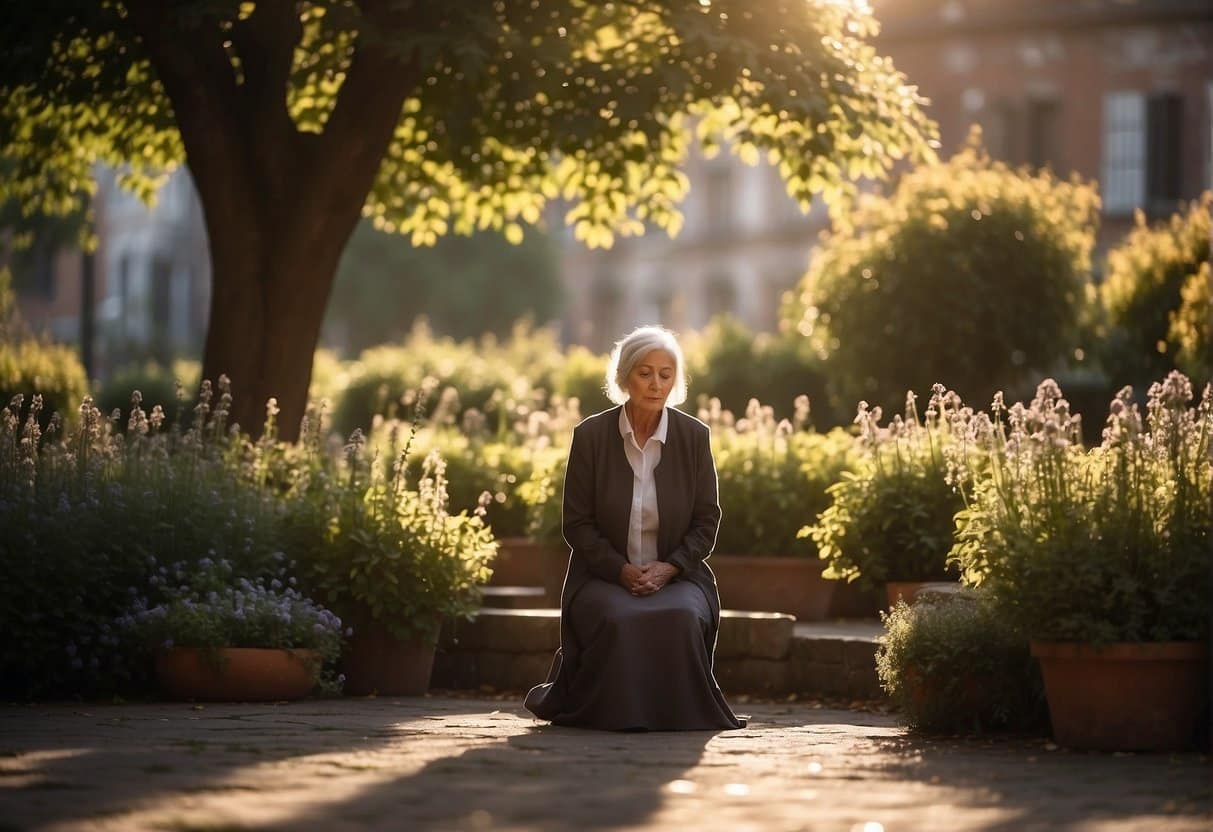Embrace a new chapter in life by becoming a nun after 50. Discover inner peace, spiritual growth, and a sense of purpose that knows no age limits.
Many women have found their calling to religious life later in life, and there are a variety of orders that welcome older candidates.
While the process of becoming a nun can be challenging, it can also be incredibly rewarding, offering a chance to deepen your faith and serve others in a meaningful way.

One of the first steps to becoming a nun is discernment or the process of determining whether religious life is right for you.
This may involve prayer, attending retreats or workshops, and speaking with spiritual mentors or members of religious orders.
If you feel called to religious life, the next step is to research different orders and communities to find one that aligns with your values and goals.
Once you’ve found an order that you’re interested in, the process of becoming a nun typically involves several stages, including postulancy, novitiate, and temporary vows.
During these stages, you’ll learn more about the order’s history and mission, participate in spiritual formation and education, and gradually take on more responsibilities within the community.
If you feel called to make a lifelong commitment to religious life, you may eventually take final vows and become a fully professed member of the order.
Understanding the Call to Religious Life
Becoming a nun at 50 or any age requires a deep understanding of the call to religious life.
This process involves discernment, consultation with a vocation director, and guidance from a spiritual director.
Discernment
Discernment is a process of prayerful reflection that helps you understand your vocation. This process involves reflecting on your relationship with God, your values, and your desires.
It is important to take time to pray and listen to God’s voice. This can be done through attending Mass, reading the Bible, and participating in spiritual retreats.
Vocation Director Consultation
After discernment, it is important to speak with a vocation director. A vocation director is a person who helps you understand your calling and guides the process of becoming a nun.
They can help you explore different religious communities and provide information on the requirements for joining. It is important to be open and honest with the vocational director about your desires and concerns.
Spiritual Director Guidance

Finally, guidance from a spiritual director is crucial in the process of becoming a nun. A spiritual director is a person who helps you deepen your relationship with God and discern His will for your life.
They can help you understand your strengths and weaknesses and provide guidance on how to overcome spiritual challenges.
Meeting the Requirements
If you are considering becoming a nun after the age of 50, there are certain requirements that you must meet.
Here are some of the most important factors to consider:
Age Considerations
While some religious orders have strict age limits, others may be more flexible. According to Synonym, numerous communities accept women over 60 who want to become nuns.
Nevertheless, some communities, particularly the more traditional ones, do have an age limit of usually 30 or 35.
It is important to research different orders and their age requirements before making a decision.
Marital Status and Annulment

If you are previously married, you may still be able to become a nun. However, the Catholic Church requires that you obtain an annulment of your previous marriage before joining a religious order.
An annulment is a declaration by the Church that the marriage was never valid in the first place. According to some experts, each religious order has its requirements for women who wish to join as nuns, and some may have stricter guidelines than others.
Health and Psychological Criteria
Becoming a nun requires a high level of physical and mental health. You will need to undergo a medical examination to ensure that you are fit enough to take on the demands of religious life.
Additionally, you will need to be psychologically stable and free from any serious mental health conditions.
According to wikiHow, you may also need to provide references from people who can attest to your character and suitability for religious life.
Exploring Religious Orders
If you are considering becoming a nun after 50, it is important to explore different religious orders and congregations to find the one that aligns with your values and beliefs. Here are some things to consider when exploring religious orders.
Types of Orders
There are many different types of religious orders, each with its unique charism and way of life.
Some orders focus on prayer and contemplation, while others are more active in serving the community. It is important to research and learn about the different types of orders to find the one that best fits your personality and interests.
Community Life
Living in a religious community is a central aspect of religious life. Nuns live in a community with other sisters, sharing their lives and resources.
Community life provides support, encouragement, and accountability, and helps nuns grow in their spiritual lives. It is important to consider whether you are called to live in a community and what type of community would be the best fit for you.
The charism of Different Congregations
Each religious congregation has a unique charism, or spiritual focus, that guides its mission and way of life.
Some congregations focus on education, while others focus on healthcare or social justice. It is important to research different congregations to find the one whose charism resonates with you and your calling.
Catholic nuns are part of a long and rich tradition of religious life in the Catholic Church.
Many congregations, such as the Sisters of Charity, have a long history of service and have made significant contributions to society.
If you are considering becoming a nun after 50, take the time to research different orders and congregations to find the one that is the best fit for you.
The Process of Joining
Becoming a nun after 50 requires patience, dedication, and a deep commitment to spiritual life.
The process of joining a religious order can be lengthy and rigorous, but it can also be one of the most rewarding experiences of your life. Here’s what you can expect during the process of becoming a nun.
Initial Stages
The first step in becoming a nun is to discern your vocation. This involves prayer, reflection, and seeking guidance from a spiritual director or mentor.
Once you are certain that you are called to religious life, you can begin exploring different religious orders and communities.
It is important to find a community that aligns with your values, interests, and spiritual beliefs.
After you have found a community that you feel drawn to, you can begin the process of becoming a postulant.
This is a period of initial formation and discernment, usually lasting from six months to two years.
During this time, you will live with the community and participate in their daily life and activities. You will also receive instruction in the Catholic faith and the charism of the community.
Formal Training
If you decide to continue on the path of becoming a nun, you will enter the novitiate. This is a period of formal training and preparation for religious life, usually lasting two years.
In this period, you will deepen your spiritual life and participate in the community’s prayer, work, and ministry. You will also receive further instruction in the Catholic faith and the charism of the community.
After completing the novitiate, you will become a candidate for final vows. This is a period of ongoing formation and preparation, usually lasting three to six years.
You will also continue to deepen your spiritual life and participate in the community’s prayer, work, and ministry. You will also receive further instruction in the Catholic faith and the charism of the community.
Taking Final Vows
When you and the community discern that you are ready, you will take your final vows as a nun.
This is a solemn and joyous occasion, marking your full commitment to religious life and the charism of the community. You will make vows of poverty, chastity, and obedience, and receive a religious habit and a new name.
After taking your final vows, you will continue to live and serve in the community for the rest of your life.
As you can see, becoming a nun after 50 requires patience, dedication, and a deep commitment to spiritual life.
The process of joining a religious order involves several stages, including postulancy, novitiate, candidacy, and final vows. It is important to find a community that aligns with your values, interests, and spiritual beliefs, and to seek guidance from a spiritual director or mentor.
With prayer, discernment, and perseverance, you can embark on a journey of faith and service that will bring you closer to God and enrich your life in countless ways.
Living as a Nun
Becoming a nun after 50 is a life-changing decision that requires dedication and commitment.
Living as a nun involves a unique set of daily life and responsibilities, prayer and service, and ongoing spiritual development.
Daily Life and Responsibilities
Living as a nun requires a life of simplicity and humility. Nuns take vows of poverty, chastity, and obedience, which means that they live a simple life without material possessions, dedicate their lives to serving others, and follow the rules of their religious order.
Nuns typically live in a convent or monastery and follow a strict daily routine that includes prayer, work, and community life.
Prayer and Service
Prayer and service are at the heart of living as a nun. Nuns spend a significant amount of time each day in prayer, both individually and as a community.
They also dedicate their lives to serving others, whether it be through teaching, nursing, or other forms of ministry. Nuns are committed to helping those in need and spreading the love and message of their faith.
Ongoing Spiritual Development
Living as a nun involves ongoing spiritual development, which means that nuns are continually growing in their faith and deepening their relationship with God.
This involves regular spiritual practices such as reading scripture, attending mass, and participating in spiritual retreats.
Nuns also receive ongoing education and training to deepen their knowledge of their faith and to better serve their community.
In summary, living as a nun after 50 involves a life of simplicity, prayer, service, and ongoing spiritual development. It requires dedication, commitment, and a deep love for God and others.
However, for those who are called to this way of life, it can be a deeply fulfilling and rewarding experience.

I am interested in joining your congregation. I’m forty six years old